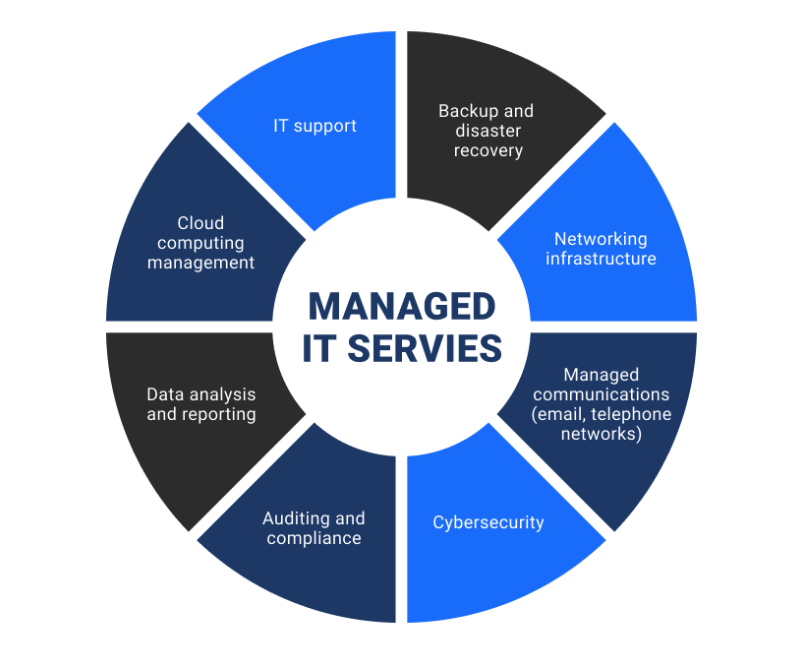
What Is Managed Service Provider in The Staffing Industry (Image by Go Ringo)

What Is Managed Service Provider in The Staffing Industry (Image by Go Ringo)
Managed Service Providers (MSPs) are a solution for managing temporary and complex staffing needs in the staffing industry. Therefore, we’ll identify how and what is a managed service provider in the staffing industry.
The adoption of MSPs is not just a trend but a response to the pressing need for efficiency and flexibility in workforce management.
Now more than ever, companies seek to optimize costs while ensuring access to top talent, a challenge MSPs are uniquely equipped to tackle.
Through MSPs, businesses can swiftly adjust their workforce composition, ensuring resilience in uncertain market conditions.
With MSPs, your business can leverage cutting-edge recruitment technology and deep expertise to offer comprehensive oversight of staffing operations.
This partnership allows your company to focus on core business functions. You can have peace of mind knowing your staffing needs are effectively managed.
According to the SIA report, MSP Global Landscape & Differentiators, via CWS 3.0, 68% of MSP contracts were newly awarded by clients without a prior MSP model.
The trend indicates strong market adoption. Utilizing MSP for small to mid-market remains buoyant.
And, of course, advancements in AI and RPA are being leveraged by MSPs to enhance efficiency and candidate matching, showcasing the role of technology in transforming staffing services.
So, let’s detail every aspect of MSP in the staffing industry here.
Managed Service Providers (MSPs) in the staffing industry offer a comprehensive suite of functions and services designed to streamline the recruitment process. Let’s take a look:
Vendor Management Systems (VMS) by MSPs represent a transformative approach to managing contingent workforces, blending technology, strategy, and service.
This VMS redefines talent acquisition and management. Of course, the VMS will continue to evolve.
The evolution is marked by growing adoption, strategic advancements, and the pursuit of best practices to leverage technology for optimal workforce management.
As an example, according to the SIA report, MSP Global Landscape & Differentiators, via Beeline, the use of VMS by companies with over 1,000 employees has notably increased, from 50% in 2009 to 80% in 2022.
The growth indicates a widespread recognition of VMS’s value in streamlining staffing processes.
Based on the same report, the global market spending for VMS witnessed a 26% growth from 2020 to 2021, reaching $226 billion, underscoring the expanding reliance on these systems across industries.
Organizations are moving beyond viewing VMS purely as a tool for cost savings and workforce visibility.
The greatest value derived from VMS is now seen in process efficiency, with 29% of users identifying this as a key benefit.
This shift highlights the evolving expectations from VMS to not only manage costs but also to optimize the entire staffing workflow.
But, while embracing VMS and MSPs offers numerous advantages, it also presents challenges.
Some challenges, such as lower profit margins for staffing firms due to competitive rate requirements and the impersonal nature of interactions, can obscure candidate fit beyond mere qualifications.
However, these challenges are countered by the benefits of streamlined candidate matching, improved communication through proxy or delegate features, and valuable analytics for continuous process improvement.
Supplier management is an integral function of MSPs that improves your company’s ability to manage your contingent workforce efficiently.
MSPs manage everything about a company’s use of temporary workers. They work as the main point of contact between the company that needs workers and the agencies that supply them.
MSPs help with:
Recently, there’s been a move toward using fewer suppliers and more digital tools in Vendor Management Systems (VMS).
Benefits of this approach include:
So, MSPs and suppliers work together in a way that goes deeper than just buying and selling.
They involve suppliers in making big decisions. This has been shown to make relationships with suppliers better.
The evolution towards strategic partnerships signifies a shift from traditional KPI-focused engagements towards a model where suppliers are integral to strategic decision-making.
The traditional challenges of compliance management are becoming opportunities for MSPs to differentiate themselves and add value to their services.
MSPs are in a unique position to leverage advanced technologies like AI, IoT, and Blockchain to enhance the staffing process.
This integration is not just about efficiency but also about staying compliant in a rapidly changing legal landscape, especially in the gig economy.
MSPs must align their recruitment processes with machine-learning techniques to manage contractual compliances and mitigate risks effectively.
This approach ensures a better fit between current technologies and control mechanisms, paving the way for a compliant and risk-mitigated staffing process.
At the same time, MSP faces the risk management issue. Handling risks, particularly in staffing, involves navigating through a myriad of legal complexities, from worker classifications to new labor laws and policies.
Their expertise in recruiting allows client companies to focus on their core business activities, saving time and reducing the likelihood of costly hiring mistakes.
Therefore, the emergence of Compliance as a Service (CaaS) represents a strategic pivot for MSPs.
CaaS transforms the complex, resource-intensive task of compliance management into a streamlined, automated process.
By adopting CaaS, MSPs can offer their clients a comprehensive compliance strategy that combines human expertise with technology tools.
This not only reduces the risk of non-compliance but also positions MSPs as indispensable partners for businesses navigating the maze of regulatory requirements.

When we talk about Workforce Analytics and Reporting, we’re diving into how the smart use of Vendor Management System (VMS) technology and analytics.
The integration between VMS and analytics is beyond keeping tabs on the contingent workforce anymore.
It’s about unlocking a treasure trove of insights that pave the way for smarter growth and smoother operations.
We knew VMS was your go-to for engaging with suppliers and candidates, making those hiring processes slicker than ever.
Yes, VMS is slashing the time and costs it takes to get someone on board and making sure you’re ticking all the compliance boxes.
And when you blend MSP expertise with VMS capabilities, you get a powerhouse duo that turns data into your most valuable ally.
And at the heart of this VMS revolution is workforce analytics. VMS is about rolling up your sleeves and getting into the nitty-gritty of data to make your workforce planning and management sharper.
By understanding the ripple effects of workforce behavior on your business’s performance, MSPs can align their strategies with your business goals, making sure everyone’s rowing in the same direction.
The buzz around workforce analytics is more than just talk. Industries far and wide are hopping on board.
Driven by a thirst for HR management tools that can dial up recruitment efficiency and fine-tune performance, all guided by the key performance indicators (KPIs).
MSP services, armed with analytics and reporting tools, are transforming the management of contingent talent lifecycles.
The expertise of MSPs in recruitment translates into a higher likelihood of matching the right candidates to the right positions.
This MSP benefits, enhancing the recruitment process’s efficiency. It means saving both money and time for your business.
One of the key strengths of MSPs lies in their agility, particularly in adapting to the fluctuating conditions of the labor market.
Additionally, MSPs incorporate the latest recruitment technologies, allowing for comprehensive management of the workforce.
Another significant advantage of partnering with an MSP is the balance it offers between outsourced services and in-house management.
This flexibility ensures your company can maintain control over your staffing strategies while benefiting from external expertise.
Compliance and risk mitigation represent another critical area where MSPs contribute value.
By managing legislative and governance requirements, MSPs ensure that businesses remain compliant across various jurisdictions.
Lastly, MSPs expand an organization’s access to talent by tapping into a global talent pool.
This global reach is crucial for businesses seeking to operate or expand in different geographies.
It’s essential to partner with an MSP that aligns with your business’s specific needs, goals, and culture. Here’s a fundamental consideration on how to make this crucial decision.
Past performance and clientele: Evaluate the MSP’s track record and industry experience. A history of successful partnerships and positive client testimonials can provide valuable insights into their capabilities and reliability.
Cloud support and scalability: Ensure the MSP can adapt and scale services according to your business growth. MSP with cloud support is also crucial for reducing costs and enhancing efficiency.
Compliance requirements: Given the importance of data security and compliance with laws, choose an MSP with robust security measures and a clear understanding of compliance requirements.
Time to hire and hiring tools: The ability to efficiently source and recruit quality candidates is paramount. Inquire about the MSP’s recruitment tools and strategies to ensure they can meet your hiring needs.
Industry expertise: Look for an MSP with experience and knowledge of your specific industry. You can count on them to understand your industry’s unique challenges and requirements.
Flexibility and scale for growth: The MSP should offer flexible services that can grow with your business. Changes in your business size or needs should be accommodated smoothly.
Technology utilization: Technology, especially AI and machine learning, plays a significant role in streamlining the hiring process. Confirm that the MSP uses the latest technology to optimize staffing and recruitment.
Vetting and onboarding process: Understanding how the MSP vets and onboards candidates is crucial. A robust process ensures you get qualified and reliable talent.
Background checks and credential verification: Ensure the MSP conducts thorough background checks and verifies candidates’ credentials to avoid potential risks.
Understanding your needs: A good MSP should make an effort to understand your contingent staffing needs deeply, including your company culture and operational structure.
Urgent staffing needs: The MSP’s ability to quickly respond to urgent staffing needs indicates a robust candidate pipeline and efficient processes.
References and case studies: Ask for references and case studies from similar organizations the MSP has worked with. This can give you a clearer picture of their expertise and effectiveness.
Compliance understanding: With the complexity of regulatory compliance, especially in different jurisdictions, an MSP that is well-versed in these matters can save your business from potential fines and penalties.
As we ponder the evolving landscape of the staffing industry, could the increasing significance of MSPs signal a transformation in workforce management strategies?
Is it not conceivable that this evolution reflects a deeper understanding of the value of partnerships that transcend traditional service models?
Therefore, isn’t it incumbent upon businesses to embark on a thoughtful exploration to identify, measure, and consider the right MSP?
This exploration, rooted in understanding the unique role of MSPs in the staffing industry, challenges us to redefine success in workforce management.
The decision, then, is not a mere selection but a strategic alignment with partners who can navigate the complexities of the modern labor market.
So, this fundamental understanding is to define what a managed service provider is in the staffing industry. The decision is up to you. Begin the identification, action and consideration to choose the right MSP.